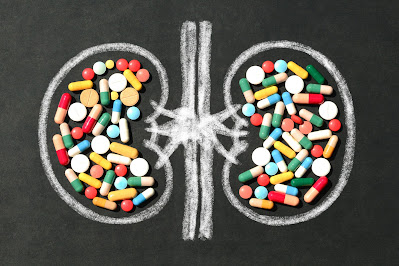Medications Used in the Treatment of Kidney Disease:
Kidney disease affects millions of people worldwide, presenting a significant healthcare challenge. Managing kidney disease necessitates a comprehensive approach, combining lifestyle modifications (such as dietary changes and exercise) with medications specifically tailored to address the underlying causes and symptoms.
These medications play a crucial role in slowing disease progression, preserving kidney function, and improving overall quality of life. In this blog post, we will explore various medications commonly used in the treatment of kidney disease, their benefits, potential side effects, and how they contribute to enhancing kidney health.
Angiotensin-Converting Enzyme (ACE) Inhibitors and Angiotensin Receptor Blockers (ARBs)
To counteract the effects of high blood pressure and proteinuria (excess protein in the urine), ACE inhibitors and ARBs are often prescribed to individuals with kidney disease. These medications work by inhibiting the actions of certain hormones that constrict blood vessels, resulting in relaxation and subsequent blood pressure reduction.
By reducing the strain on the kidneys, ACE inhibitors and ARBs can slow down the progression of kidney disease. Furthermore, they have been shown to protect against further damage to the kidneys. While generally well-tolerated, some individuals may experience a persistent dry cough or low blood pressure as side effects. Regular monitoring is essential to ensure these medications are effectively managing the patient's condition.
Diuretics
Diuretics, also known as water pills, are frequently prescribed to manage fluid retention (edema) associated with kidney disease. By increasing urine production, diuretics help eliminate excess fluid from the body, thus reducing swelling and alleviating pressure on the kidneys.
Moreover, diuretics are effective in lowering blood pressure and are commonly used to treat conditions such as heart failure. However, it is crucial to exercise caution while using diuretics as excessive fluid loss can lead to dehydration and electrolyte imbalances. Regular monitoring of kidney function and electrolyte levels is necessary to ensure the safe and effective use of diuretics.
Phosphate Binders
Phosphate binders are medications prescribed for individuals with chronic kidney disease (CKD) who have elevated blood phosphorus levels. When kidneys are impaired, they struggle to eliminate excess phosphorus effectively, leading to its buildup in the blood.
This elevation in blood phosphorus can have detrimental effects on bone health and cardiovascular function. Phosphate binders work by binding to dietary phosphorus in the intestines, preventing its absorption into the bloodstream.
By doing so, these medications reduce the risk of hyperphosphatemia and subsequent complications. Taking phosphate binders with meals helps optimize their effectiveness. However, they can cause digestive issues, including constipation. Adhering to the prescribed dosage and following dietary recommendations are crucial to enhance medication efficacy.
Erythropoiesis-Stimulating Agents (ESAs)
Anemia is a common complication of kidney disease, primarily arising due to reduced production of a hormone called erythropoietin by damaged kidneys. ESAs are synthetic versions of erythropoietin that stimulate red blood cell production. By increasing red blood cell levels, ESAs improve energy levels, reduce fatigue, and enhance overall quality of life for individuals with kidney disease.
However, caution must be exercised when using ESAs, as they can increase blood pressure, promote blood clotting, and contribute to complications associated with vascular access. Regular monitoring and dose adjustments are necessary to maintain optimal hemoglobin levels while minimizing adverse effects.
Immunotherapy Drugs
In certain cases of kidney disease, particularly autoimmune conditions like lupus nephritis, immunotherapy drugs may be utilized. These medications modulate the immune system and suppress its abnormal response, thereby reducing inflammation and preserving kidney function.
Immunotherapy can help manage symptoms, prevent disease progression, and potentially induce remission. However, as with most immunosuppressants, there is an increased risk of infections and other adverse reactions. Close monitoring by a healthcare professional is required throughout the treatment period to mitigate these risks.
Conclusion:
In conclusion, medications are an integral component of the treatment plan for kidney disease. From managing blood pressure and proteinuria to addressing fluid retention, elevated phosphorus levels, anemia, and autoimmune-related inflammation, each medication plays a specific role in improving kidney health and overall well-being.
However, it is crucial for individuals with kidney disease to work closely with their healthcare providers, adhere to prescribed treatments, and maintain regular monitoring to optimize medication effectiveness and minimize potential side effects.
Furthermore, it is important to remember that medications alone cannot provide a complete solution for kidney disease. Lifestyle modifications, such as following a kidney-friendly diet, engaging in regular exercise, and avoiding smoking and excessive alcohol consumption, are also essential in managing the condition effectively.
By adopting a comprehensive approach that combines medication usage, lifestyle adjustments, and ongoing medical supervision, individuals with kidney disease can take proactive steps to slow disease progression, preserve kidney function, and enhance their overall quality of life. With patience, dedication, and the guidance of healthcare professionals, individuals can navigate their journey with kidney disease and strive for better kidney health.

.jpg)


Comments
Post a Comment
Share your views